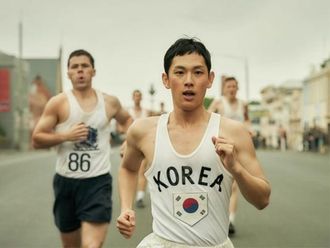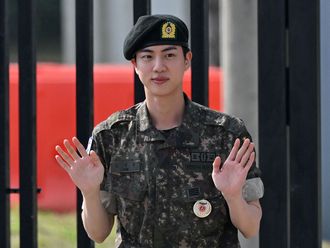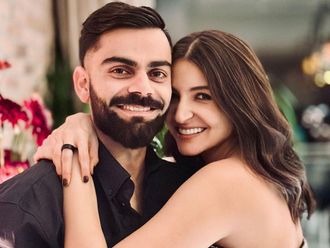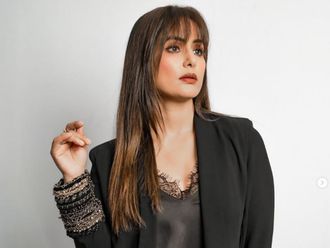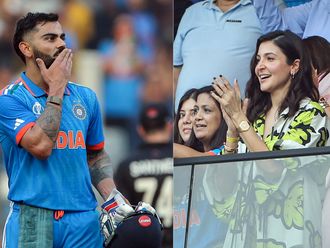The second edition of the Gulf Film Festival will be held from April 9 to 15 under the patronage of Shaikh Majid Bin Mohammad Bin Rashid Al Maktoum, chairman of the Dubai Culture and Arts Authority (Dubai Culture).
The festival will offer a platform for documentary filmmakers to display their new work.
The films represent talents from various Gulf countries, the highest originating from Iraq, and will compete for three prizes of Dh25,000, Dh20,000 and Dh15,000.
The short films in competition represent a range of themes. Mustafa Abbas's Rain revolves around discovering the truth about a death. Door by Waleed Al Shehi charts a journey into invisible human depths.
In Hani Al Sheibani's Young Sadness, an 11-year old boy starts to lose his hair. Butterfly Kiss by Nayla Al Khaja revolves around the transformation of a 17-year-old girl into a beautiful young woman.
The Half Heart by Bilal Abdullah is about a lady who has committed a grave sin. In Juma Al Sha'ali's Paradise Evening two Emirati soldiers are about to go through a life-changing experience during the Gulf War of 1990.
Night by Abdullah Al Ramsi tells the story of a man married to a difficult wife. Key by Ahmad Zain explores the mysterious happenings in an old house and Widad by Manal Bint Amro explores matters of the heart.
Dubai Abu Al Houl is the youngest participant in the festival.
“I receive a lot of support for my films and my ambitions. There are several talented filmmakers in the UAE who can compete with any international professional filmmaker,'' says the Grade VIII student who took part in last year's festival, too.
“I admire many directors. Steven Spielberg is on the top of the list. I adore the films of Hayao Miyazaki, a Japanese animation filmmaker who has won Oscars. His movies demonstrate magic and fantasy, which I live by too.
"The big name in the UAE film industry is Mohammad Harib. Through his work, I've learnt that I, and many other Arabs, can compete at the international level and win awards.''
The student-filmmaker said she has loved drawing since I was a child.
“Combining that with my passion for cartoons and animation, I ended up wanting to make films. I began when I was 10. My first project in animation was a three-minute cartoon called Ali and Meera.''
Dubai is fascinated by fiction and fantasy. Asked if she wants to pass on any message through her films, she replies: “It depends on whom I'm targeting the film at.
For instance, Dubaian, the short animation I submitted to the Gulf Film festival, was intended for an international audience.
Dubaian talks about the history and culture of Dubai with a twist.'' She is now working on a film based on a fantasy novel called Galagolia.
“Participating for the first time in the Gulf Film Festival was the best thing that has happened to me. It was overwhelming and exciting that I got the chance. It was unforgettable and I'm proud of my accomplishments so far.''
Mustafa Abbas, a film director with promise, believes it is important to spread positive vibes.
“We only live once. Part of being happy is making others happy,'' he says.
Abbas received his Bachelor's of Fine Arts in film from Middlesex University in Dubai over a year ago.
“I believe no one can teach you creativity. However, we do live in a time when it is crucial to be a college graduate. That's why I did the course.''
“There is only one truthful answer about my attraction to filmmaking. I don't believe one chooses to go into storytelling. Certain story lines appealed to me at a young age and because of my trait as a visual person, I find myself telling stories best through the medium of film.
"God could have made me a doctor or a painter. But he made me a filmmaker. So I was meant to be what I'm now.''
Abbas started his career two years ago. He has been making films that go up to 50 to 60 minutes each. His 100 Miles was screened at the Dubai International Film Festival in 2007.
“When I was 19, I realised that the films I was making were time-consuming. Anybody could see that this was something that I took seriously even at that age.
"I believe it is important to do what you love, so that was the age when I realised that making films was more than just a hobby, this is who I'm supposed to be.''
Asked what inspires his work, he replies:
“My main inspiration is and will always be people. I don't consciously get inspired from other films anymore. True, I have yet to make my first feature-length film but I've been doing this for 12 years now. Somewhere along the way, you develop your own style.''
Speaking of the message he attempts to deliver through his films, Mustafa says: “It's always nice to have messages and morals in a film but my main objective will always be to tell a good story, which is thought-provoking and memorable.
"Telling a good story consists of many things — symbolism and subliminal messages are some. It is the little things that we human beings are most intrigued by.''
Mustafa admires those whose works are original and have a respect for their audience. “The directors I look up to are Martin Scorsese, Michael Mann and, most importantly, Christopher Nolan.
He is working on his first feature film, which will be in Arabic and English.'' Mustafa has recently completed a novel, which he plans to publish.
"Mustafa says people in the UAE have a great interest in the arts, including film. “In this small city, we have two film festivals, which by itself says a lot.''
Mustafa is thrilled to be part of the Gulf Film Festival. “I was supposed to take part in it last year, with my short film The Alley, which was screened at the Cannes Film Festival but unfortunately it did not come through.
Thankfully, I have been given a second chance and look forward to exhibiting my latest short film, Rain.''
Manal Bint Amro has always been fascinated by the cinema world.
“Film helps in reaching out to people and leave an impression on them. It allows me to express my thoughts on events and characters,'' says Manal, who started filmmaking in 2006 after studying mass communication at UAE University.
“The screen transforms words on paper to visible characters and makes viewers interact with them, support them, admire them. Sometimes they go beyond, following their steps and adopting their philosophy of life.
"Such magical transformation has had the strong positive impact on the way I look at life,'' Manal says. This aspect of film helped her translate her hobby into a career.
“The feedback — whether it's constructive or negative — strengthens me and encourages me to do the best I can.''
The filmmaker says the lens of her camera will always focus on women.
“A woman's happiness or sadness or the situation she is in have always captured my attention. I like to discuss the truth, contradictions and the issues that might sometimes hurt the viewer but they keep the door open for discussion.''
Manal appreciates and respects all creative minds because they provide great support to each other and the rest of the world.
“We have people that we are so proud of. Their immortal accomplishments are examples for others.''
Among the artists she names are Nojoom Al Ganem, Nawaf Al Jinahi, Saeed Salmin and Mohammad Al Hammadi.
Manal is working on her sixth film, which is called Impermanent Cages.
“I am writing the script and directing as well. The film will star the well-known actress Zahrah Arafat. In addition to that I have three other scripts in hand on which my colleagues and other directors will work.''
Slices of life in the Gulf
Some of the documentaries to be screened at the show:
- ‘Adasat Maftouha' (Open Shutters) chronicles a photography project in which women from five Iraqi cities train together in Damascus.
As they train, they discuss their struggles, loves, betrayals and experiences of war. The film explores how traumatised people can resist the ‘un-making' of their world and assert themselves through creativity.
The film's Iraqi-British director Maysoon Pachachi is a founding member of London-based Women's Action for Iraq. - ‘Hayat Ma Baad Al Sukut' (Life after the fall) follows Iraqi director Qasim Abid's return to Baghdad in 2003.
Shot over the next four years, the film charts the optimism of 2003 descending into despair as the country struggles with growing anarchy.
The film was named the Best Film at the Munich International Film Festival and won the Golden Hawk at the Arab Film Festival in Rotterdam in 2008. - ‘Memory and Roots' documents the life and memories of the Iraqi writer Ghayib, who lives in exile.
The film shows his struggle against the powers that suppress the collective memory of his nation, documented by filmmaker Farouk Dawod. - ‘When the People Spoke-Part 3' is a fascinating glimpse into the Kuwaiti electoral process, following candidates in the election in which women participated for the first time.
‘When the People Spoke - Part 2', the previous documentary by director Amer Alzuhair, won the first prize at the 2008 Gulf Film Festival. - Two films explore the beauty and atmosphere of special spaces: ‘Jaber Alwan' by Qais Al Zubaidi asks about the source of Jaber Alwan's inspiration, following the theme of colour from a studio in Rome to an old traditional house in Damascus.
Faisal Al Otaiba's ‘The Fort' explores the similarities between life and a fort. - Four documentaries delve into identity and loss. ‘Only A Beginning' is a 19-minute visual diary that uses archival and experimental imagery to trace filmmaker Noor Hamidaddin's journey into the life of a Muslim woman in the Arab world.
‘What I've Lost', a Canada-Iraq co-production by Duraid Munajim, follows 15 Iraqi refugees living in Jordan who share their experiences since the Iraq war.
Koutaiba Al Janabi's ‘Against the Light' is a film about Mahmoud Sabri, an Iraqi artist in exile. Jamal Ameen's ‘Virus' deals with a spontaneous weekend trip of five Iraqi friends.
The minibus in which they travel breaks down but the friends begin to push it forward in spite of their disagreements.


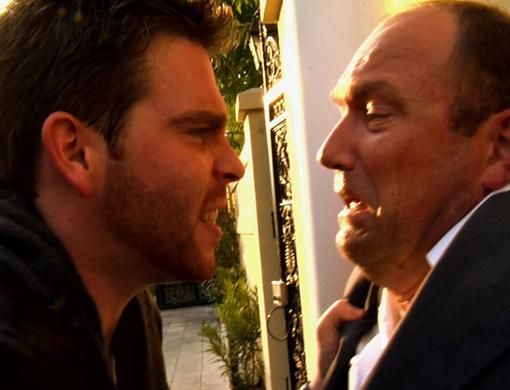
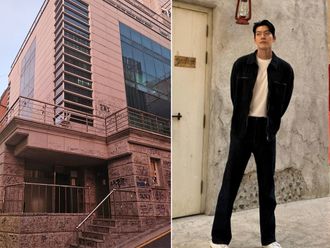
_resources1_16a30b3d57a_small.jpg)
